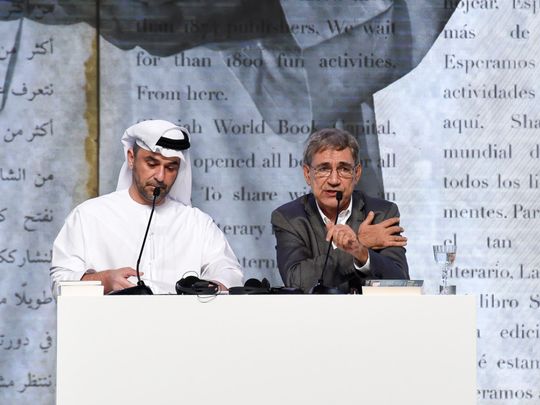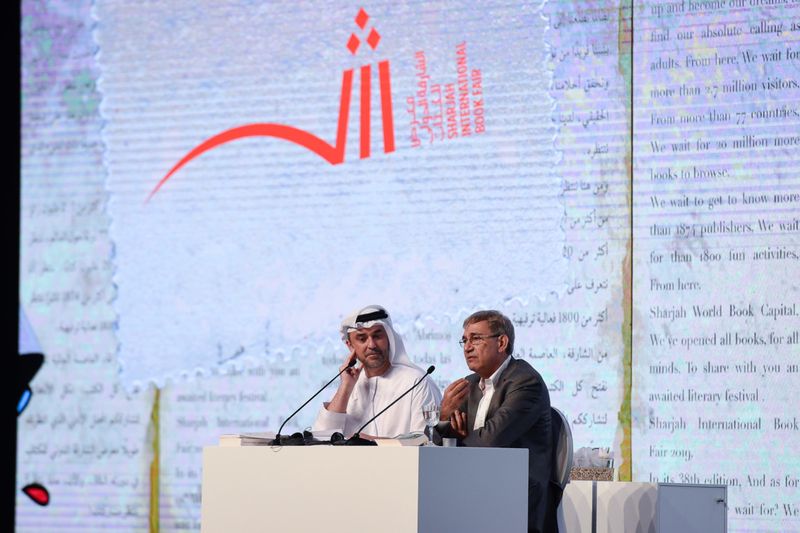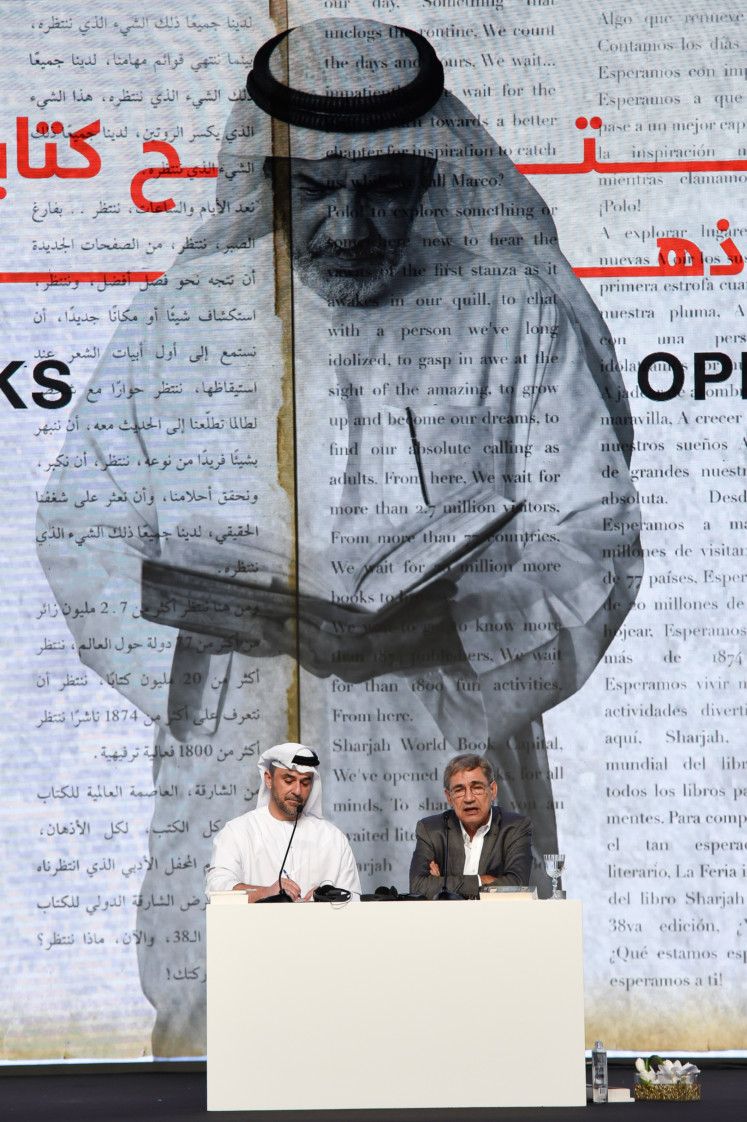
Sharjah: A steady barrage of misinformation and Turkish government propaganda in the media is turning more Turks to fiction and the novel, according to the country’s first Nobel laureate and author Orhan Pamuk.
“People are reading more novels in Turkey today because newspapers and the TV are full of Turkish government propaganda. This is the joke among writers in Istanbul today,” Pamuk said with his trademark humour at a session discussing his life and works at the 38th Sharjah International Book Fair on Wednesday night, which was attended by His Highness Dr Sheikh Sultan Bin Mohammed Al Qasimi, Member of the Supreme Council and Ruler of Sharjah.
Why Pamuk calls himself a happy writer
Describing himself as a “happy writer,” Pamuk said: “Initially I used to be very upset with any discussion [about my writings]. Now I’m a happy writer… There are so many of my friend writers who are in jail in Turkey – so I’m happy that I’m still writing. I feel embarrassed to talk about my problems,” Pamuk said to loud applause from the packed auditorium at the Expo Centre in Sharjah.
But Pamuk – who has faced criminal charges and even death threats in Turkey – said he would not be drawn to speculation about the country’s future. In 2005, criminal charges were brought against Pamuk – the country’s best-selling author – for having “publicly denigrated Turkish identity” for raising the issue of the ‘Armenian genocide’ of 1915–17 to a Swiss publication. The charges were dropped in 2006, though only after a virulent hate campaign against him by ultra-nationalist voices.
When Pamuk received his Nobel Prize for literature in 2006, he was praised for making Istanbul “an indispensable literary territory, equal to Dostoevsky’s St Petersburg, James Joyce’s Dublin or Marcel Proust’s Paris”. Yet, according to Pamuk, when he decided to be a novelist and started writing in 1974, there were hardly any novels around “because we didn’t have the same individuality as Europeans”.
Who has Pamuk been compared to?
“What the West discovered through Renaissance was the gazers eye of a human being, and how the world seemed to a human being. They discovered the problem of human individuality. Some cultures celebrate individuality while some ask for conformity and a communal purpose. We Turks sit between the East and West. So individuality is inevitable – but what matters is every human being. That’s what I’ve been preoccupied with for the last 40 years,” he told the session moderator Omar Ghobash, Assistant Minister for Cultural Affairs at the Ministry of Foreign Affairs and International Cooperation.
Pamuk’s fascination with the wonders of Ottoman, Arab and Islamic culture is tempered by the post-modern archetypes that he deploys in his novels – with the result that his work is imbued with the unique experience of, say, Ottoman art with a Borges or Italo Calvino twist. Critics and fellow novelists such as John Updike have also compared the prodigious literary contributions of Pamuk to Thomas Mann, James Joyce and Franz Kafka.

Who does Pamuk write for?
But as an author who has sold 13 million books and has been translated into 63 languages, and at once described as an avant-garde and a best-seller, who does Pamuk write for?
“When you write, you don’t think of a market – you want to think of your readers, the people with whom you have a more poetic relationship. When Tolstoy or Balzac wrote about Paris or St Petersburg, they wrote about new things. People loved to read these new experiences,” Pamuk said.

What are some of Pamuk’s unorthodox views?
In a session replete with Pamuk’s trademark quips (“Every educated Turkish male is a poet by the age of 20”), occasional self-realisations (“A screw was lose in my head at the age of 22. So I left studying engineering and architecture and started painting and then became a novelist”) and declarations (“I’m not an accidental writer – I plan and work very hard on my books”), Pamuk regaled the audience with tales of his journey as a writer, his self-discipline and unorthodox views on art.
“There’s an innate feeling in us that you want to do art without any purpose. We do art like you do sport. But we are human beings – so we invent a purpose for art. Thus art becomes a performance,” Pamuk said while explaining the art of writing.
What Pamuk had to say about his writings
On being asked why he writes, Pamuk referred back to one of his earlier writings: “I write because I can’t do normal work like other people… I write because I am angry at all of you, angry at everyone. I write because I love sitting in a room all day writing. I write because I can only partake in real life by changing it. I write because I am afraid of being forgotten. I write because I have a belief in the immortality of libraries, and in the way my books sit on the shelf. I write because I wish to escape from the foreboding that there is a place I must go but—just as in a dream—I can’t quite get there. I write because I have never managed to be happy. I write to be happy.”
With 10 novels under his belt, Pamuk hinted that his next work would be the result of three decades of thinking. “I’m writing a book now which I’ve thought about for 30 years. I don’t think I’ll have any regret about the book but may be about a sentence or a character or a chapter. I always think I’ll finish one novel in two years – and then I take four years instead. Maybe that’s because I come from a family of engineers and I like to plan a lot. But once I finish a novel, it’s like getting a High School diploma,” he said.

BOX: WHO IS ORHAN PAMUK?
• Ferit Orhan Pamuk is frequently hailed as Turkey’s foremost novelist, screenwriter and academic.
• He was born on June 7, 1952 and grew up in Istanbul in a wealthy yet declining upper-class family.
• More than 13 million of Pamuk’s books have been sold and translated into 63 languages – making him Turkey’s best-selling writer.
• He was the recipient of the 2006 Nobel Prize in Literature – the country’s first Nobel laureate.
• He was also instrumental in setting up the European Writers’ Parliament, along with Portuguese Nobel laureate José Saramago.
• Pamuk’s most talked about novels are The Black Book (1990; recounting the tale of a lawyer whose wife goes missing); My Name is Red (1998; a murder mystery about an Ottoman Sultan in 16th century Istanbul who commissions an illustrated book to celebrate his dominion); Snow (2002; the tale of a poet and political refugee who spends 12 years in Germany).








